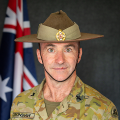Should I fire or not? Should I confront colleagues about disrespectful behaviour? Why can’t I help this sick child? How do I convince local police not to lock up female detainees in a depot without separate cells for women? These are examples of issues soldiers face today, which is why they need ethical foundations for decision-making, according to Ethics and Military Practice.
The volume is from the European International Society of Military Ethics (EuroISME). With 8 chapters from 10 academics from the Netherlands, it takes a step back from military ethic issues to explore how we form and reflect on moral values to navigate ethical dilemmas. What does it take to ensure soldiers treat enemies as people with whom they may one day be reconciled, instead of opponents who need to be eliminated as an end in itself?
Morality and ethics are central to the 2025 Cove theme ‘The State of the Army Profession’. The Chief of Army has spoken on how three distinct pillars of the Australian Army Profession are: ‘jurisdiction’ in the ethical application of violence; ‘expertise’ and developing a professional body of knowledge; and ‘self-regulation’ to keep to professional standards. Ethics and Military Practice does not specifically use this language but does illustrate these pillars.
One chapter treats how such things as euphemistic language, displacement or diffusion of responsibility, dehumanisation, and victim-blaming blur moral standards. Soldiers sometimes use these as coping strategies, but when they become too common or cannot be turned off, they are alarm bells of moral disengagement.
Another chapter considers the virtue of loyalty and whether it is directed mainly to colleagues and the institution, or to principles and the profession. It discusses how this was a key issue for helicopter pilot High Thompson at My Lai (loyal to the ethics of protecting the rights of civilians). But others have come down on the wrong side of loyalty, such as the Canadians soldiers beating a Somalian boy to death, the mistreating of POWs at Abu Ghraib, and anyone who expects others to look the other way when they behave unethically.
There is an excellent treatment of moral injury and the guilt, shame, or betrayal common among those who may be good soldiers but not good people, or who witness other not good people behaving in ways less than what can be described as good soldiering.
Perhaps the most tragic chapter describes a Predator killing its own troops but then analysing the lack of communication, over-trust of technology, hesitancy of team members to speak up, and urgency for action that led to the errors.
Another chapter offers a distinctly organisational perspective on ethics. It suggests that bureaucratic ‘machine-like’ organisations struggle to deal with complex and changing conditions, which is why militaries need ethics, not just rules.
The two most powerful chapters revolve around case studies. One considers the case study of a military nurse wanting but not permitted to help an Afghan father’s small, sick baby. The author advocates teaching ‘moral competence’ by considering such dilemmas from consequentialist, deontological and virtue ethics perspectives; fostering Socratic dialogue to foster moral reflection; and using ‘live learning’ to invite reflecting on experience.
A final chapter underlines how moral development is essential to training military professionals. It offers a series of case examples of ethics and didactics – narratives of helping or taking advantage of locals, torture, an instructor getting angry with recruits, and other instructors preoccupied with rules. It illustrates how competent military professionals are ‘reflective practitioners’ who can ask themselves (‘reflective’) what values and morality form the foundation for their and others’ behaviour and translate that into responsible action in daily practice (‘practitioning’).
I will return especially to these two case study chapters, given that this is the kind of ethical character development that may best help safeguard the state of the Army Profession. The book overall is relevant to readers interested in the emotions, thinking, and behaviour that help safeguard individual and organisational morality and ethics.
Bibliographical Notes
The book’s publisher’s details are Ethics and Military Practice, edited by Désirée Verweij, Peter Olsthoorn, and Eva van Baarle (Leiden: Brill, 2022)










I find this volume is particularly interesting, but a price tag on a certain online purchase platform of $231.65 makes it not quite as interesting!
Are you aware of anywhere that it can be obtained for not quite so silly money.
Thanks Duncan ex 6 RAR